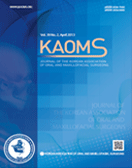Journal of the Korean Association of Oral and Maxillofacial Surgeons
- P-ISSN2234-7550
- E-ISSN2234-5930
- SCOPUS, KCI, ESCI
 ISSN : 2234-7550
ISSN : 2234-7550
Cervicofacial infection in a Nigerian tertiary health institution: a retrospective analysis of 77 cases
Rowland Agbara (Ahmadu Bello University Teaching Hospital, Shika-Zaria, Kaduna, Nigeria)
Daniel Otasowie Osunde (University of Calabar Teaching Hospital, Calabar, Nigeria)
Charles N Ononiwu (Ahmadu Bello University Teaching Hospital, Zaria, Nigeria)
Abstract
Objectives: Infection involving the orbit, zygomatic space, lateral pharyngeal space, or hemifacial and oral floorphlegmon is referred to as cervicofa-cial infection (CFI). When diagnosis and/or adequate treatment are delayed, these infections can be life-threatening. Most cases are the result of odon-togenic infections. We highlight our experiences in the management of this life-threatening condition.Materials and Methods: This was a retrospective study of patients who presented with CFI from December 2005 to June 2012 at the Oral and Max-illofacial Surgery Clinic or the Accident and Emergency Unit of Ahmadu Bello University Teaching Hospital (Zaria, Nigeria). The medical records of all patients who presented with either localized or diffuse infection of the maxillofacial soft tissue spaces were retrospectively collected. Data collected was analyzed using SPSS version 13.0 and are expressed as descriptive and inferential statistics.Results: Of the 77 patients, 49 patients (63.6%) were males, a male to female ratio of 1:7.5. The ages ranged from two years to 75 years with a mean of 35.0±19.3 years, although most patients were older than 40 years. The duration of symptoms prior to presentation ranged from 6 to 60 days, with a mean of 11.0±9.4 days. More than 90% of the patients presented to the clinic within the first10 days. The most commonly involved anatomical space was the submandibular space (n=29, 37.7%), followed by hemifacial space (n=22, 28.6%) and buccal space (n=7, 9.1%). Ludwig angina accounted for about 7.8% of the cases.Conclusion: CFI most commonly involves the submandibular space, typically affects individuals with a low level of education, and is influencedby traditional medical practices. Despite improved health care delivery, CFI remains a significant problem in developing countries
- keywords
- Cervicofacial, Infection, Management, Odontogengic
- Downloaded
- Viewed
- 0KCI Citations
- 0WOS Citations